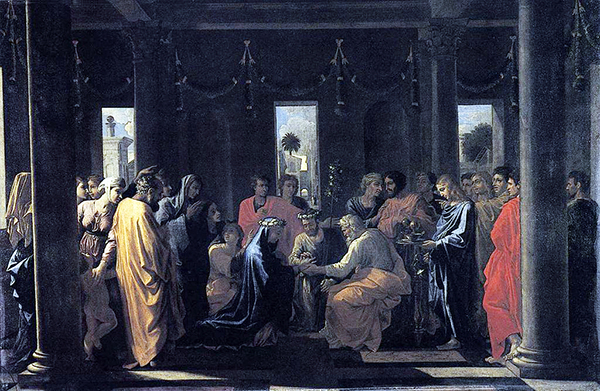Young Wafflers and the "Culture of Commitment"
- JULIAN KWASNIEWSKI
The Irish priest limped to the sacristy. After suffering a stroke, he was working his way back to functionality, recovering the use of the stubbornly unresponsive limbs on one side of his body.
 The Seven Sacraments: Marriage by Nicolas Poussin, Public domain, via Wikimedia Commons.
The Seven Sacraments: Marriage by Nicolas Poussin, Public domain, via Wikimedia Commons.
Difficult and frustrating, yes. But committed to going forward with his life, literally and metaphorically. As the priest said once, "In my youth people weren't so sentimental. They decided what they were doing with their lives and got on with it."
Today people don't "get on with it." Indecision and waffling affect young people like myself as never before. From college admissions departments trying to deal with epidemics of late commitments to endless dating spirals, almost everyone is bogged down trying to "keep their options open."
When it comes to vocation, the inability to decide retards the growth of many people; even "final decisions" are surrounded by "escape hatches."
According to Scholastic theologians, final religious vows could not be dispensed even by the pope. Marriage annulments were once hardly accessible. Today, however, laicization of priests, dispensations from religious vows, and increasingly simplified annulment processes rob words like "final" and "indissoluble" of their ... finality. "Forever" seems to mean "as long as I still want."
Different currents of "free love" and the modern lack of rootedness can be traced to various polluted springs; splintering Protestantism, Communist ideas of marriage, the aesthetes and decadents of the late Victorian period, or New Age hippies of the 1960s.
The Catholic Church, however, has historically been the rock against which change can be measured, the community in which commitment is most esteemed, the institution that has defied every other culture and religion in its continuous succession of bishops, in its indelible sacraments, and—most counterculturally of all—in its defense of marriage as an indissoluble union.
Today, when we need a "culture of commitment" more than ever, the Church seems to be pressing the buttons on unheard-of "escape hatches." In 2016, Amoris laetitia opened the door to Communion for the "divorced and remarried." Christianity's claims to universality were all but abandoned in the Abu Dhabi declaration. "Female ordination" is being "synodalized." And Fiducia supplicans announced "a specific and innovative contribution to the pastoral meaning of blessings," which allows the blessing of same-sex "couples," "based on the pastoral vision of Pope Francis."
John Paul II's "culture of life" will never be created without a corresponding and underlying "culture of commitment." The culture of commitment is what enables life to flourish: the child of the unwed mother will never survive without commitment; the marriage on the rocks will never survive without commitment; the religious community will never survive without commitment.
The opposite mentality—the "culture of non-commitment"—prevails at every level of society. Multi-installment payments soften the commitment of paying for something (which credit cards have already been doing for decades, enslaving many in usury). University students take longer and longer to declare majors at a university, with a seemingly endless option to switch tracks and add another year (or two) to their four-year degree. The "discernment" of dating continues to engagement and beyond with temporary shacking up or one-night stands; divorce is an ever-open door in modern "marriages."
And never mind deciding whether or not you are committed to a specific gender: some Wokesters are "genderfluid," which means they don't have to make up their minds which sex they are, indefinitely. But abortion activists who oppose the availability of abortion reversal pills, which can often reverse the effects of hormonal abortifacients if taken soon enough, seem to think women should not have every option open.
What does all this mean concretely? Not only are our apps sold with "free trials—cancel anytime," so are our marriages, persons, pregnancies, and payments. The results are obvious. Broken hearts and families, millions of aborted children, and an inability in both young and old to achieve greatness via commitment to arduous goods.
How have things been different historically? The early settlers of the American West come to mind: "Pa" from The Little House on the Prairie books made decisions he could hardly reverse. Once you were homesteading, your options were to continue homesteading or die. With their whole lives in a covered wagon, settlers traversed dangerous deserts. Because they had committed to a course of action, they pushed on.
Call to mind any other age of history, and you will find it marked by commitment. The Ancient Romans; the Crusaders; the humanists of the Renaissance; Napoleon; the Allied Powers of World War II. Kings, saints, dictators—all alike relied on commitments to achieve good or ill.
Heroes are born of commitment. Epics like Beowulf, the Odyssey, or The Lord of the Rings are built around the commitment of men to their families and fatherlands and the defeat of the powers that threaten them. If commitment is one of the things that propel Herods, Hitlers, or Sarumans, it is also one of the things that enable giants like St John the Baptist, Churchill, or Frodo to conquer them.
In order to foster a sub-culture of commitment, I believe one of the very first things that needs to be done is for those who have resolutely committed themselves to a vocation and task in life to share their stories of commitment hardships, blessings, and triumphs. Commitment is a limitation, yes, but without limitation "how could there be any love, adventure, or beatitude?"
We young people long to hear of parents, priests, and adventurers who have won glory, or least a measure of happiness and virtue, against great odds through fidelity to their commitments. To our mentors, examples, and shepherds, I cry, "Stop opening needless escape hatches, and instead empower us for the greatness of commitment. Tell us your tales, and do not offer us any option but that of beautiful holiness!"
 This is Meaghen Gonzalez, Editor of CERC. I hope you appreciated this piece. We curate these articles especially for believers like you.
This is Meaghen Gonzalez, Editor of CERC. I hope you appreciated this piece. We curate these articles especially for believers like you.
Please show your appreciation by making a $3 donation. CERC is entirely reader supported.

Acknowledgement
 Julian Kwasniewski. "Young Wafflers and the 'Culture of Commitment'." The Catholic Thing (January 13, 2024).
Julian Kwasniewski. "Young Wafflers and the 'Culture of Commitment'." The Catholic Thing (January 13, 2024).
Reprinted with permission from The Catholic Thing.
The Author
Julian Kwasniewski is a musician specializing in renaissance Lute and vocal music, an artist and graphic designer, as well as marketing consultant for several Catholic companies. His writings have appeared in National Catholic Register, Latin Mass Magazine, OnePeterFive, and New Liturgical Movement. You can find some of his artwork on Etsy.
Copyright © 2024 The Catholic Thing



